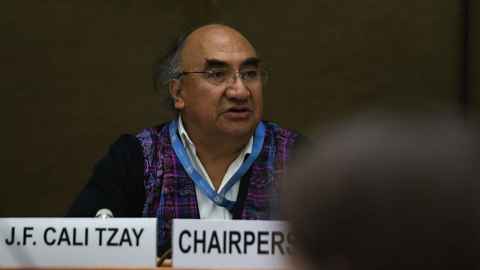UN expert on Indigenous rights visits Waipapa Marae
10 April 2024
A visiting expert discusses how constitutions can be instrumental in protecting Indigenous peoples' rights and cultures.

Constitutional recognition of Indigenous rights in certain countries has been pivotal in safeguarding the collective rights of Indigenous peoples, United Nations’ expert on the rights of Indigenous Peoples, José Francisco Calí Tzay, told those gathered at his sold-out Waipapa Taumata Rau, University of Auckland lecture.
The Special Rapporteur was invited to speak at Waipapa Marae as part of the 2024 Designing our Constitution conference.
A Mayan Cakchiquel from Guatemala, Calí Tzay has represented Indigenous peoples at the United Nations since the early 1980s, addressing human rights violations in Guatemala and around the world.
His public lecture, in honour of law Professor Nin Thomas, who passed in 2014, sheds light on instances where constitutional recognition has propelled the use of international human rights instruments, such as the UN Declaration on the Rights of Indigenous Peoples.
In his speech Calí Tzay shares examples of constitutional courts that have successfully advanced Indigenous rights, such as the Constitutional Court of Canada and the Colombian Constitutional Court.
He says Ecuador stands out as a country that robustly protects the cultural rights of Indigenous Peoples, with the Indigenous worldview being an integral part of the Ecuadorian constitution itself.
“For instance, Sumak Kawsay, or good living—a concept rooted in Indigenous philosophy—is enshrined within Ecuador’s constitution,” he said. “It defines critical areas such as water and food, culture and science, education, habitat and housing, health and work, the rights of communities, peoples, and nationalities, the rights of nature, the economy, and social participation and control.
“Moreover, according to Indigenous cosmology, Pachamama is regarded as a living being, and the Constitution of Ecuador duly recognises Pachamama as a subject of rights.”
The UN Special Rapporteur’s sold-out speech marked the culmination of two days of intensive workshops and discussions at the University. These sessions brought together thought leaders from across the country, fostering a rich exchange of ideas around the practical steps that can be taken to design an inclusive constitution for Aotearoa based on te Tiriti o Waitangi.
Watch the Special Rapporteur on the rights of Indigenous Peoples' speech: Constitutional reform and the importance of harmonization with international treaties: cases of successes and reforms on Indigenous Peoples.